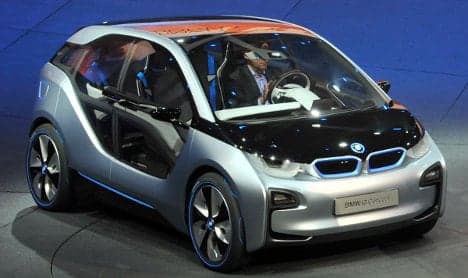BMW unveils electric and hybrid concept cars

Six weeks before the Frankfurt Motor Show, BMW has unveiled concept vehicles that the company hopes will make it a trend-setter in the electric car business.
The i3 is a sleek small compact model set to go into production within the next few years. It runs entirely on electric power and should be affordable enough for city-dwelling families, although BMW had not released price estimates.
The sporty i8 may be more interesting to BMW enthusiasts. Also set to be produced in the next two or three years, it is a hybrid sports car that is supposed to have the fuel economy of a compact vehicle.
The cars are part of a planned BMW sub-brand that will be geared to target urban-dwellers that care about the environment and are looking to transition to electric driving in the long-term.
“This car is to show everyone right away that the future has begun now,” BMW Chief Designer Adrian von Hooydonk said, according the website of news magazine Der Spiegel, referring to the i3.
Click here for BMW photo gallery
So far, mainstream distribution of electric cars has been hampered by high prices the necessity of expensive and complicated electric charging equipment and electric vehicles’ lack of agility compared to petrol-powered cars.
But BMW says the i3 will be different. It can hit 100 kilometre per hour in under eight seconds and charges its battery in a standard wall socket – a full charge can be reached in six hours and that time can be cut by 80 percent by use of a special charger.
Although BMW is not yet saying how far an i3 production version be able to drive on a single charge, company officials say its range would be appropriate for 90 percent of people’s normal uses. An optional range-extending petrol engine would allow for longer driving distances by charging a small generator to maintain the car’s battery charge.
The i8, meanwhile, will be able to hit 100 km/h in three seconds and be able to travel 35 kilometres on electric power alone.
The Local/mdm
Comments
See Also
The i3 is a sleek small compact model set to go into production within the next few years. It runs entirely on electric power and should be affordable enough for city-dwelling families, although BMW had not released price estimates.
The sporty i8 may be more interesting to BMW enthusiasts. Also set to be produced in the next two or three years, it is a hybrid sports car that is supposed to have the fuel economy of a compact vehicle.
The cars are part of a planned BMW sub-brand that will be geared to target urban-dwellers that care about the environment and are looking to transition to electric driving in the long-term.
“This car is to show everyone right away that the future has begun now,” BMW Chief Designer Adrian von Hooydonk said, according the website of news magazine Der Spiegel, referring to the i3.
Click here for BMW photo gallery
So far, mainstream distribution of electric cars has been hampered by high prices the necessity of expensive and complicated electric charging equipment and electric vehicles’ lack of agility compared to petrol-powered cars.
But BMW says the i3 will be different. It can hit 100 kilometre per hour in under eight seconds and charges its battery in a standard wall socket – a full charge can be reached in six hours and that time can be cut by 80 percent by use of a special charger.
Although BMW is not yet saying how far an i3 production version be able to drive on a single charge, company officials say its range would be appropriate for 90 percent of people’s normal uses. An optional range-extending petrol engine would allow for longer driving distances by charging a small generator to maintain the car’s battery charge.
The i8, meanwhile, will be able to hit 100 km/h in three seconds and be able to travel 35 kilometres on electric power alone.
The Local/mdm
Join the conversation in our comments section below. Share your own views and experience and if you have a question or suggestion for our journalists then email us at [email protected].
Please keep comments civil, constructive and on topic – and make sure to read our terms of use before getting involved.
Please log in here to leave a comment.